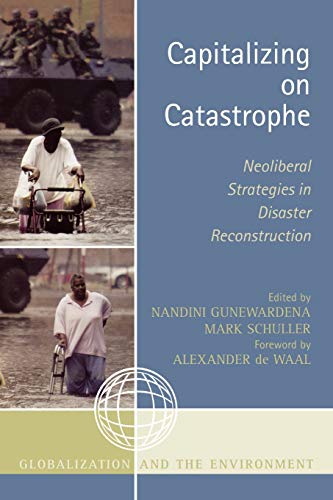Items related to Capitalizing on Catastrophe: Neoliberal Strategies...
Capitalizing on Catastrophe: Neoliberal Strategies in Disaster Reconstruction (Globalization and the Environment) - Softcover

Synopsis
In Capitalizing on Catastrophe an international group of scholars and professionals critically examine how local communities around the world have prepared for and responded to recent cataclysms. The book's principal focus is the increasing trend to rely on the private sector to deal with natural disasters and other forms of large-scale devastation, from hurricanes and tsunamis to civil wars and industrial accidents. Called "disaster capitalism" by its critics, the tendency to contract private interests to solve massive, urgent public problems may be inevitable but is extremely problematic―especially with respect to peoples who need help the most. Can private relief groups give the highest priority to potential and actual victims of large disasters, for example, if that means devoting fewer resources to protecting tourism and other profitable industries? The high-profile contributors to this volume straightforwardly tackle such timely and difficult questions of great public concern.
"synopsis" may belong to another edition of this title.
About the Author
Nandini Gunewardena is adjunct professor at Western Washington University. Mark Schuller is assistant professor of anthropology and African American studies at the City University of New York.
Review
Capitalizing on Catastrophe critically examines the motivations and agendas that fuel the political will to act in the name of humanitarian assistance to the large-scale crises and human tragedies of our times. Using diverse examples of disaster from around the world, the authors tease apart the complex continuum of causality, response, and consequence―asking the basic questions of who pays, who profits, and to what effect. In so doing, they put a human face to disaster response, and that face is not a pretty one. Nandini Gunewardena and Mark Schuller have pulled together an incredibly strong collection of case studies, framed in a sharp and clear analysis with pragmatic suggestions for change. In a world of escalating chaos and misery, this collection offers the reader a useful tool to assess recent experiences. More importantly, Capitalizing on Catastrophe offers pragmatic strategies to emphasize human needs in humanitarian response. (Barbara Rose Johnston, Center for Political Ecology, Santa Cruz)
This is a stunning book that builds on, and extends, previous research on disaster, social vulnerability, and reconstruction. The contributors discuss social vulnerability and neoliberalism, disaster capitalism, humanitarian issues, and cultural data sets from around the world. The book provides a rich combination of ethnography and theory. (Linda M. Whiteford, University of South Florida)
"Moralized discourse served as a protective bubble that provided immunity from rigorous analysis. That bubble has burst, but only on the top floor of the ivory tower. The overwhelming majority of media coverage and academic writing remains entrapped in an untheorized consensus that relief and rehabilitation are good things beyond rebuke. Capitalizing on Catastrophe is an important exercise in scholarship. It brings the phenomenon of neo-liberal disaster capitalism into sharp focus, defining the field in a theoretical and comparative manner and exploring some important case studies. This book is also an essential exercise in framing an emergent public policy issue." (Alexander de Waal, Harvard University From The Foreword)
The book's strengths lie in the breadth of its case studies and its impressive balance between fine ethnographic detail and consistency of argument in which neither is sacrificed. Owing to its accessible writing and analytically coherent selection of research, Capitalizing on Catastrophe will be of great interest to students, scholars, and general readers concerned about the insidious machinations at work in the global field of disaster capitalism. It is both shocking and convincing. (Human Ecology, Spring 2010)
Valuable suggestions on emergency situations take on a new light and potential importance. The volume draws strength from the variety of case studies and broad experience of the contributing authors, many of whom spent years in the discussed communities, interviewing stakeholders and compiling data. (Alexis Pierce, Journal of Homeland Security and Emergency Management)
"About this title" may belong to another edition of this title.
- PublisherAltaMira Press
- Publication date2008
- ISBN 10 0759111030
- ISBN 13 9780759111035
- BindingPaperback
- LanguageEnglish
- Number of pages288
- EditorGunewardena Nandini, Schuller Mark
- Rating
Shipping:
FREE
Within U.S.A.
Search results for Capitalizing on Catastrophe: Neoliberal Strategies...
Capitalizing on Catastrophe: Neoliberal Strategies in Disaster Reconstruction
Seller: ThriftBooks-Dallas, Dallas, TX, U.S.A.
Paperback. Condition: Good. No Jacket. Pages can have notes/highlighting. Spine may show signs of wear. ~ ThriftBooks: Read More, Spend Less 1.06. Seller Inventory # G0759111030I3N00
Quantity: 1 available
Capitalizing on Catastrophe: Neoliberal Strategies in Disaster Reconstruction
Seller: ThriftBooks-Atlanta, AUSTELL, GA, U.S.A.
Paperback. Condition: Very Good. No Jacket. May have limited writing in cover pages. Pages are unmarked. ~ ThriftBooks: Read More, Spend Less 1.06. Seller Inventory # G0759111030I4N00
Quantity: 1 available
Capitalizing on Catastrophe: Neoliberal Strategies in Disaster Reconstruction (Globalization and the Environment)
Seller: Anybook.com, Lincoln, United Kingdom
Condition: Fair. This is an ex-library book and may have the usual library/used-book markings inside.This book has soft covers. In fair condition, suitable as a study copy. Please note the Image in this listing is a stock photo and may not match the covers of the actual item,550grams, ISBN:9780759111035. Seller Inventory # 7081375
Quantity: 1 available
Capitalizing on Catastrophe: Neoliberal Strategies in Disaster Reconstruction
Seller: Anybook.com, Lincoln, United Kingdom
Condition: Good. This is an ex-library book and may have the usual library/used-book markings inside.This book has soft covers. In good all round condition. Please note the Image in this listing is a stock photo and may not match the covers of the actual item,550grams, ISBN:9780759111035. Seller Inventory # 3949525
Quantity: 1 available
Capitalizing on Catastrophe: Neoliberal Strategies in Disaster Reconstruction (Globalization and the Environment)
Seller: dsmbooks, Liverpool, United Kingdom
paperback. Condition: Good. Good. book. Seller Inventory # D8S0-3-M-0759111030-6
Quantity: 1 available

